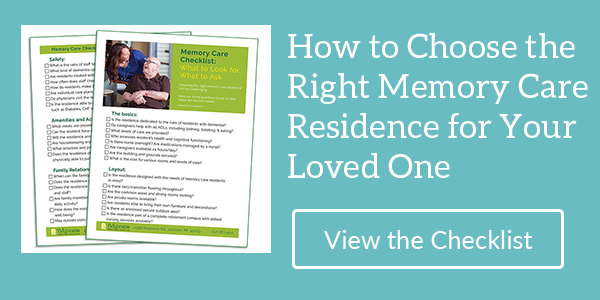Cognitive changes in older adults are expected in the aging process and are one of the most common signs of aging. But what is normal and what are the signs of something worse like mild cognitive decline or dementia? When spending time with your senior loved ones there are some things to look for that signal something is amiss and should be addressed by a physician.
An often-undiagnosed problem
It is especially important that families observe and keep track of cognitive changes in older adults because according to the National Institute on Aging article, “Assessing Cognitive Impairment in Older Patients,” studies have shown that physicians often are unaware of and do not test for or diagnose cognitive impairment. But screening for cognitive changes in older adults is key to finding the cause or causes (which can be related to other conditions) and treating them appropriately. It can also indicate to family and caregivers that more hands-on help is necessary to ensure their loved ones are safe, well fed and as independent as possible.
What is normal cognitive aging?
Like all parts of the body, the brain ages, and as a result, there are some pretty irritating things that occur that can cause family and their loved ones to suspect problems. But according to the dementia.org article, “Is It Dementia Or Old Age?” some cognitive changes in older adults are not necessarily signs of a bigger problem. These include decreased or slower ability to recall or remember, solve problems, react, pay attention, concentrate, and learn.
What to look for – mild cognitive impairment
Mom might complain about losing her phone or car keys now and again, but in reality, who hasn’t done either or both? Although forgetfulness may seem more prevalent in older adults that’s just one of the cognitive changes in older adults you should watch for.
Mild cognitive impairment is the stage between the cognitive changes of normal aging and the onset of dementia. Although MCI may not seem significant or make daily life difficult, it can be a sign that more changes are coming. Although everyone with MCI does not automatically get worse and may even get better with treatment, it is best to know the signs of MCI, which according to the Mayo Clinic article, “Mild cognitive impairment (MCI),” include:
- Forgetting more often.
- Forgetting important events.
- Losing a train of thought or the thread of a conversation.
- Becoming overwhelmed by decision making, completing tasks or following instructions.
- Getting lost in familiar places.
- Impulsivity and poor judgment.
In addition, those with MCI may also feel depressed, irritable, anxious, or apathetic. When any of these cognitive changes in older adults occur, it is time to consult a physician for evaluation and treatment.
What to look for – dementia
Dementia is an umbrella term for different conditions that cause cognitive decline. It is important to note, however, that dementia is not a normal part of aging and many people live long lives and never experience any symptoms of dementia. According to the NIA article “What Is Dementia? Symptoms, Types, and Diagnosis” the causes of dementia are many and can include genetics, diseases like Alzheimer’s, Parkinson’s and Huntington’s, and vascular disease that damages or interrupts the flow of blood to the brain.
The signs of dementia are often similar to those of MCI, although they may be more pronounced and may also include:
- Trouble speaking, reading or writing.
- Wandering and getting lost.
- Inability to manage money.
- Repeating questions.
- Using odd words for everyday things.
- Slowed ability to complete normal tasks.
- Loss of interest in daily life and events.
- Hallucinations, delusions or paranoia.
- Acting impulsively.
- Lack of caring for others’ feelings.
- Mobility and balance problems.
When any of these cognitive changes in older adults are present, various tests may be used to diagnose dementia. Among these are tests to assess memory, problem-solving, language and math skills, balance, reflexes, and sensory responses; brain scans to rule out strokes and tumors; psychiatric evaluation for depression; genetic testing; and blood tests for Alzheimer’s disease.
Can anything prevent cognitive changes in older adults?
Although it is not yet possible to prevent all kinds of cognitive changes in older adults living a healthy lifestyle that includes daily exercise, good nutrition, drinking plenty of water, and regular socialization may help. Also, keep up with regular doctor visits, take all medications as prescribed and speak up when something doesn’t seem right. Find out more in the AARP article, “Memory Loss Often Caused by More General and Reversible Health Issues.”
Ganton’s Countryside offers both assisted living and memory care with compassionate staff and attention to each resident’s needs. For more information about Countryside, please call Margaret Nagel at (517) 206-5000 or download our brochure to learn about our care levels, cost, and amenities.


